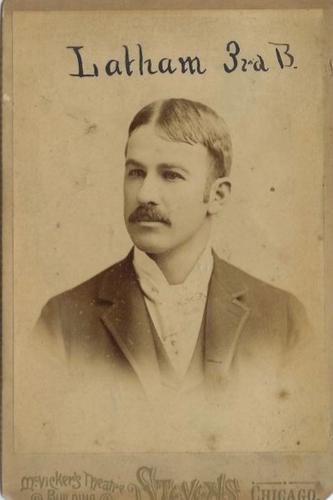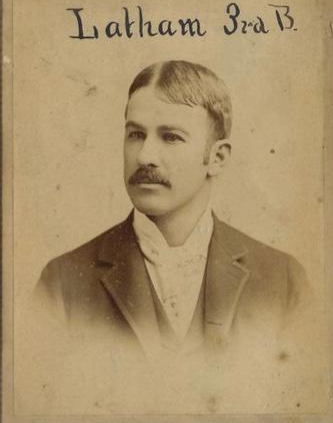August 18, 1891: Cincinnati’s Arlie Latham knocks down Cleveland’s Jimmy McAleer, who ‘rushes The Dude with a bat’
 The 1891 Cincinnati Reds looked to improve on their 77-55 record and fourth-place National League finish of 1890, but an early-season slump seemed to sap the life out of the team. By June 27 the Reds were last in the eight-team NL, 12 games behind the front-running New York Giants and Chicago Colts.
The 1891 Cincinnati Reds looked to improve on their 77-55 record and fourth-place National League finish of 1890, but an early-season slump seemed to sap the life out of the team. By June 27 the Reds were last in the eight-team NL, 12 games behind the front-running New York Giants and Chicago Colts.
It was hoped the addition of Pete Browning, who had been released by Pittsburgh on June 26 and signed with Cincinnati four days later, would provide a spark. The 30-year-old outfielder had notched his third career batting title a season earlier, hitting .373 with the Players’ League’s Cleveland Infants. A three-game winning streak shortly after Browning’s arrival gave hope to the team, but they soon resorted back to their mediocre performance from earlier in the season.
Until a seven-game winning streak to close out the season, the most fight the Reds showed through the remainder of the season was on August 18, in a game against the Cleveland Spiders, and even then the fight did not translate to a win. “A bitter feeling has long existed between members of the Cincinnati and Cleveland clubs,” wrote the Cincinnati Enquirer. Those feelings came to a head in the eighth inning of the game August 18 in Cincinnati.1
The Spiders began the day in sixth place, 13 games behind the first-place Colts. The Reds were seventh, 4½ games in back of Cleveland. A day earlier, the Reds had edged the Spiders, 3-2.
The game began with Lee Viau in the pitching box for Cleveland, while Cincinnati countered with Billy Rhines. Cincinnati got on the board first with RBIs by Bug Holliday in the first and Browning in the third. Cleveland clawed back a run in the sixth when 19-year-old center fielder George Davis scored on an overthrow by Cincinnati that allowed him to scamper from first to home.
Through seven innings the game had been marred by poor umpiring, with both teams claiming umpire Phil Powers was responsible for the runs they had each given up with his questionable judgment. In the bottom of the eighth, a heated incident erupted involving Cincinnati third baseman Arlie Latham, a noted bench jockey nicknamed The Freshest Man on Earth and The Dude; Cleveland left fielder Jimmy McAleer, one of the game’s best defensive outfielders of the 1890s; and Powers, a former big-league catcher serving in his eighth season as a major-league umpire.
With the Reds leading 2-1, Cleveland came to bat in the eighth. Shortstop Ed McKean singled to center with one out and Davis reached on an error by second baseman Bid McPhee.
With runners at first and second, third baseman Patsy Tebeau popped up to Latham at third.
Latham let the ball hit the ground, then quickly scooped it up and fired it to McPhee in hopes of getting a double play. McPhee tagged McKean, who was still standing on the base, and stepped on the bag to force out Davis.
Cincinnati thought it had turned an inning-ending double play, but umpire Powers saw it differently and, as the Rochester Democrat & Chronicle reported, “by one of his own original interpretations, declared only Davis out.”2
Based on the rules at the time, it should have been ruled a double play, provided Latham had not touched the ball before it hit the ground. Powers seems to have incorrectly believed that Latham had touched the ball, thus depriving Cincinnati of its apparent double play.3
Cincinnati captain Latham charged at Powers to argue the call, leaving Browning, who had come in from his position in left field, standing on third with the ball. While Latham argued with Powers, Childs, who was now coaching at third base, snatched the ball from Browning’s hand and threw it into his vacant spot in left. Immediately the Cleveland baserunners ran for home, instigating another round of arguing. Order was eventually restored and both runners returned to their bases.
Tensions remained high. The next batter, first baseman Jake Virtue, popped up to center fielder Holliday, who dropped the ball for an error, allowing both runners to score for a 3-2 Cleveland lead. This was the breaking point for Latham, as he screamed across the field at Powers, “Now see what you have done with your miserable decision.”4
Cleveland’s McAleer came up next. He drove in Virtue with a single and ended up on second on the throw to home. Another hit sent McAleer toward third. Latham, seeing Powers was not paying attention, attempted to block McAleer from rounding the bag and heading for home. McAleer responded by punching Latham in the side. Latham continued to block his path. McAleer kicked Latham twice in a “vicious manner.”5
The Democrat & Chronicle detailed Latham’s response: “Quick as a flash Latham’s right went out, and by a quick swing he caught McAleer under the jaw. Up into the air he went and down on his back like a log.”6
The Cincinnati Enquirer described the wild scene that followed. While a dazed McAleer got to his feet and staggered away, Cleveland catcher Charles Zimmer “rushed Latham like a mad bull.” After coming to his senses, McAleer, who “had murder in heart,” grabbed a bat and while frenzied with rage and the bat brandished above his head, bore down on Latham in a threatening manner. He chased Latham to the outfield with nearly all the Cleveland players in pursuit. Seeing he was not going to catch him, McAleer threw the bat at Latham. “It sped through the air with terrific force, but Latham was lucky enough to dodge.”7
Undeterred, McAleer, along with Childs, McKean, Viau, and Zimmer, continued to chase Latham. The park police as well as members of the city police force raced toward the outfield to help, as spectators swarmed onto the field. George Smith was the only teammate of Latham’s who ran to his aid.8
A melee ensued as players, police, and spectators jostled each other all over the field. The police eventually surrounded Latham to protect him from further harm. As the players began to return to their benches, the police set about clearing the spectators who had rushed the field. It was a full half-hour before order was restored and play resumed. After the fracas, interest in the game waned from both fans and players. Cleveland added two insurance runs and won, 6-2.
After the game the police followed Latham to the clubhouse for his protection, while the Cleveland players got into their carriages to return to their hotel. As a result of his altercation with Latham, McAleer suffered a swollen jaw and a wound inside his mouth that required a couple of stitches to close.
Latham explained his actions after the game. “I hit McAleer on the spur of the moment. I was so worked up over Powers’ awful decision that the minute McAleer kicked me I lost my head and struck out. I realized the instant I hit him I had done wrong and that was the reason I ran. I didn’t want to increase the trouble. I knew if I stopped and fought back the rest of the Cleveland players would jump me, and then the spectators would jump them, and there would be bloodshed.”9
The Pittsburgh Post summed up the brawl by writing, “Latham Knocks Down McAleer Who Rushes The Dude with a Bat.”10
In Cleveland’s 4-3 win a day later, further incidents were avoided when Latham, while chasing an overthrown ball from Browning that rolled near Cleveland’s bench, found his path blocked by McAleer in clear provocation.
“Had Latham been the least bit pugnaciously inclined there would have been repetition yesterday of the disgraceful brawl of the day previous,” wrote the Enquirer. “Latham sensibly declined the challenge. It was not through fear that he did not, however, for Latham is physically capable of whipping two McAleers.”11
Cleveland finished fifth in the NL in 1891, 22½ games behind pennant-winning Boston. Cincinnati was tied with Pittsburgh for seventh place, 30½ games back.
Neither Latham nor McAleer was punished for their role in the brawl, though umpire Powers was not as fortunate. Powers, whose judgment as an umpire had been heavily criticized over his eight-season career, was released by the National League, and never worked a major-league game again. The Philadelphia Inquirer wrote upon his release, “Umpire Phil Powers has been unanimously elected a member of the Society for the Promotion of Riot.”12
Acknowledgments
This article was fact-checked by Laura Peebles and copy-edited by Len Levin.
Photo credit: Arlie Latham, Trading Card Database.
Sources
In addition to the sources cited in the Notes, the author consulted Baseball-Reference.com and Retrosheet.org.
Notes
1 “Fast and Furious,” Cincinnati Enquirer, August 19, 1891: 2.
2 “A Row at Cincinnati,” Rochester Democrat and Chronicle, August 19, 1891: 7.
3 Richard Hershberger, “Revisiting the Origin of the Infield Fly Rule,” SABR Baseball Research Journal, Vol. 47, No. 2 (2018), https://sabr.org/journal/article/revisiting-the-origin-of-the-infield-fly-rule/.
4 “Fast and Furious.”
5 “Fast and Furious.”
6 “A Row at Cincinnati.”
7 “Fast and Furious.”
8 Smith was known as Germany Smith later in his career.
9 “Fast and Furious.”
10 “Latham Knocks Down McAleer Who Rushes The Dude with a Bat,” Pittsburgh Post, August 19, 1891: 6.
11 “Base-Ball Gossip.” Cincinnati Enquirer, August 20, 1891: 2.
12 “Chat of the Diamond,” Philadelphia Inquirer, August 21, 1891: 3.
Additional Stats
Cleveland Spiders 6
Cincinnati Reds 2
League Park
Cincinnati, OH
Corrections? Additions?
If you can help us improve this game story, contact us.


